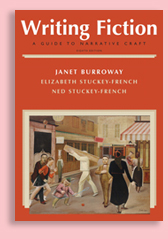Writing Fiction Janet Burroway Ebook
Today’s guest post is by freelance writer Nicolette Morrison: One of the “rules” often touted is that writers must always spend hours reading. It helps in improving comprehension and grammar, but most importantly it guides them to find their footing as writers.

With help for every would-be novelist, this handbook and anthology is the most widely used guide to the techniques of fiction. The text deals with the elements of fiction one step at a time, and workshop exercises provide practice in each technique. Available in: Paperback. The most widely used and respected text in its field, Writing Fiction, Ninth Edition guides the novice story writer. DOWNLOAD Writing Fiction: A Guide to Narrative Craft: United States Edition By Janet Burroway, Elizabeth Stuckey-French, Ned Stuckey-French [PDF EBOOK. May 29, 2017. Janet Burroway, author of Raw Silk and Writing Fiction “Sharon Solwitz has an ear so attuned to teen speech, teen humor, and, finally and most convincingly, teen angst that her novel crackles with urgency. She follows the rise and fall of adolescent moods, patient with their extremes and sympathetic to the.
Reading can give you an idea of what you like and what you don’t in a piece of writing. It’s about taking every bit of the things you like in a creative piece and trying to incorporate them into your own voice. It’s about widening your range of influences and learning what works for your style of writing. Though writers are free to read whatever book comes to mind, there are some works that every writer needs to spend the time to read, digest, and apply. For people who have to work magic on a blank piece of paper (or a computer document for some), a word of motivation from some of the most prolific and successful authors can go a long way. Below are nine books that can give any writer that necessary push to hold their pens mightier than ever. • Letters to a Young Poet – Rainer Maria Rilke. “This most of all: ask yourself in the most silent hour of your night: must I write?” The book is a compilation of ten letters to a young poet Rilke corresponded with during an important stage of his artistic exploration.
Writing Fiction Janet Burroway Ebook
Giving his non-condescending and genuine advice to the poet, Rilke imparted advice that many writers hold dear even years after they first read the book. • How Fiction Works – James Wood. “Literature differs from life in that life is amorphously full of detail, and rarely directs us toward it, wheras literature teaches us to notice.” Written not just for writers but for readers as well, How Fiction Works gives a fresh take on the connection of real life and fiction. It also provides a good perspective on the creative writing process. Wood’s entertaining prose clearly shows his love for books—something any reader can appreciate. • On Writing – Stephen King. “The scariest moment is always just before you start.” One of the most prolific writers of horror fiction shares his thoughts on the creative process and his experiences on the difficulties and triumphs in writing.
He talks about writing in a frank and straightforward fashion. The book offers an imaginative memoir focusing on the life of someone devoted to fiction writing. • Zen in the Art of Writing – Ray Bradbury. “And what, you ask, does writing teach us? First and foremost, it reminds us that we are alive and that it is a gift and a privilege, not a right.” Readers will get lost in Bradbury’s tales and anecdotes that are written with vigor and passion.